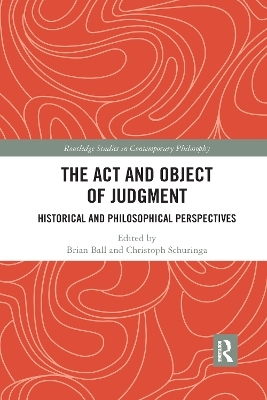
The Act and Object of Judgment
Routledge (Verlag)
978-1-032-17833-2 (ISBN)
This book presents 12 original essays on historical and contemporary philosophical discussions of judgment. The central issues explored in this volume can be separated into two groups namely, those concerning the act and object of judgment. What kind of act is judgment? How is it related to a range of other mental acts, states, and dispositions? Where and how does assertive force enter in? Is there a distinct category of negative judgments, or are these simply judgments whose objects are negative? Concerning the object of judgment: How many objects are there of a given judgment? One, as on the dual relation theory of Frege and Moore? Or many as in Russell’s later multiple relation theory? If there is a single object, is it a proposition? And if so, is it a force-neutral, abstract entity that might equally figure as the object of a range of intentional attitudes? Or is it somehow constitutively tied to the act itself? These and related questions are approached from a variety of historical and contemporary perspectives. This book sheds new light on current controversies by drawing on the details of the distinct intellectual contexts in which previous philosophers’ positions about the nature of judgment were formulated. In turn, new directions in present-day research promise to raise novel interpretive prospects and challenges in the history of philosophy.
Brian Ball is Senior Lecturer in Philosophy at New College of the Humanities, London, and Associate Member of the Faculty of Philosophy at the University of Oxford; he was previously Lecturer in Philosophy at Balliol College, Oxford (2014–2016), and at St Anne’s College, Oxford (2008–2014). He works in the philosophies of mind and language, epistemology, and metaphysics, and has published papers in these areas in journals including Analysis, Erkenntnis, Mind and Language, Philosophical Psychology, and Philosophical Quarterly. Christoph Schuringa is Lecturer in Philosophy at New College of the Humanities, and has recently been a visiting scholar at the Universities of Leipzig and Pittsburgh. He works in the history of German philosophy and in practical philosophy, and has published in journals including History of Philosophy Quarterly and International Yearbook of Hermeneutics.
Introduction
Brian Ball
1. Affirmation, Judgment, and Epistemic Theodicy in Descartes and Spinoza
Martin Lin
2. Locke and Leibniz on Judgment: the First-Person Perspective and the Danger of Psychologism
Maria van der Schaar
3. Kant’s Logic of Judgment: Against the Relational Approach
Alexandra Newton
4. Time and Modality in Hegel’s Account of Judgment
Paul Redding
5. Bolzano’s Theory of Judgment
Mark Siebel
6. Correctness First: Brentano on Judgment and Truth
Mark Textor
7. Judgment, Reasons and Feelings
Simon Blackburn
8. Twardowski on Judgment
Peter Simons
9. Attitudinal Objects: their Ontology and Importance for Philosophy and Natural Language Semantics
Friederike Moltmann
10. About vs Concerns
Daniel Morgan
11. Predication and Two Concepts of Judgment
Indrek Reiland
12. How is Logical Inference Possible?
Christopher Peacocke
| Erscheinungsdatum | 01.10.2021 |
|---|---|
| Reihe/Serie | Routledge Studies in Contemporary Philosophy |
| Verlagsort | London |
| Sprache | englisch |
| Maße | 152 x 229 mm |
| Gewicht | 367 g |
| Themenwelt | Geisteswissenschaften ► Philosophie ► Erkenntnistheorie / Wissenschaftstheorie |
| ISBN-10 | 1-032-17833-7 / 1032178337 |
| ISBN-13 | 978-1-032-17833-2 / 9781032178332 |
| Zustand | Neuware |
| Informationen gemäß Produktsicherheitsverordnung (GPSR) | |
| Haben Sie eine Frage zum Produkt? |
aus dem Bereich

![Was heißt Denken?. Vorlesung Wintersemester 1951/52. [Was bedeutet das alles?] - Martin Heidegger](/media/113619842)
